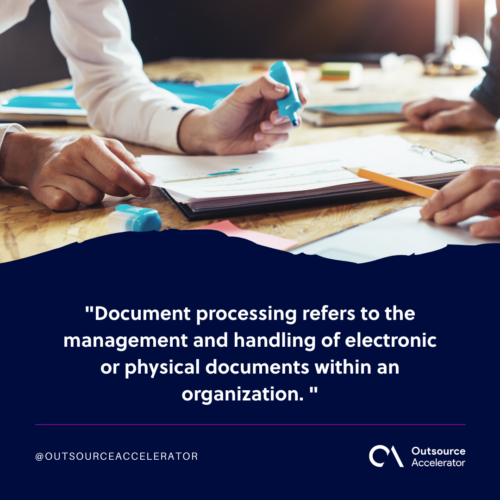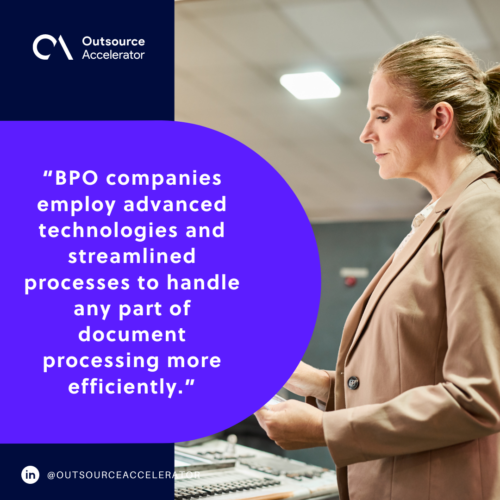Simplify workflows with outsourced document processing

Efficiency is key in any line of business. Every minute wasted on tedious and repetitive tasks is a minute lost in potential growth and success.
One area that often falls victim to inefficiency is document processing — a critical part of any organization’s day-to-day operations.
Outsourcing document processing is a game-changing solution that can revolutionize your workflows. In fact, a LinkedIn piece revealed delegating tasks that are part of database management could result in up to 200% revenue growth.
So, let’s delve deeper into this transformative solution and discover how it can benefit your organization.
Document processing definition
Document processing refers to the management and handling of electronic or physical documents within an organization.
It involves a range of activities, including a document’s:
- Creation
- Conversion
- Editing
- Storage
- Retrieval
- Distribution
These activities can be time-consuming and tedious, especially when handled manually. However, these tasks are essential for organizing and managing information effectively to support business processes.

What is intelligent document processing (IDP)?
Intelligent document processing (IDP) takes the traditional method to the next level by incorporating artificial intelligence (AI) and machine learning (ML) technologies.
IDP automates document-related tasks, letting businesses extract valuable insights from unstructured data quickly.
For example, IDP can automatically extract key information from invoices, contracts, and forms, reducing manual effort and human error.
Document processing techniques
Various techniques are employed in document processing to simplify workflows. Some of these methods include:
1. Optical character recognition (OCR). OCR technology recognizes text characters within scanned documents, making them searchable and editable.
2. Natural language processing (NLP). NLP lets computers or other devices understand and interpret human language. This way is particularly useful for processing unstructured documents, such as emails and customer feedback.
3. Data extraction. Also known as data capture, this method automatically extracts structured data from semi-structured or unstructured documents. Retrieved information could be names, addresses, and numbers that are then put into databases or other systems.
4. Document classification. It involves assigning documents into predefined categories based on their content. This helps in organizing and categorizing large volumes of documents.
Leveraging these techniques can significantly improve the efficiency of processing documents, reduce manual labor, and free up valuable resources for more strategic tasks.
Why should you consider outsourcing document processing
So why should your organization consider outsourcing document processing? Here are a few compelling reasons:
Save time and money
Manual processing of documents can be time-consuming and labor-intensive, requiring significant manpower and infrastructure. By outsourcing, you can free up valuable time and redirect resources to core business activities.
Improve data accuracy and quality
Human error is an inherent risk when you process documents manually. Each keystroke presents an opportunity for mistakes that can have far-reaching consequences.
Farming out this task to specialized service providers significantly reduces the chances of those errors and improves data accuracy. It also lessens the worries about possible errors still experienced in IDP.
Advanced technologies paired with humanized QA employed by providers ensure precision in data extraction, classification, and analysis.
Better security and compliance
Data security and compliance are critical considerations when you’re outsourcing. Outsourced document processing ensures that your sensitive and confidential information is handled in a secure and compliant manner.
Trusted service providers implement robust security measures, including encryption, access controls, and regular audits to safeguard your data.
Furthermore, these firms stay up-to-date with evolving regulations and compliance requirements. They have the expertise to navigate complex data protection laws, industry-specific regulations, and privacy standards.
Streamline workflows
Outsourcing this function allows you to optimize and streamline your workflows.
BPO companies employ advanced technologies and streamlined processes to handle any part of document processing more efficiently. This is especially true if they specialize in handling administrative or back-office work.
By automating routine tasks, outsourcing enables faster turnaround times and improved productivity. This, in turn, enhances overall operational efficiency, minimizes bottlenecks, and accelerates decision-making processes.
Outsource document processing needs with SixEleven
SixEleven is backed by years of experience in IDP. This premier BPO firm offers a range of customizable solutions tailored to your organization’s specific requirements.
For your document processing needs, SixEleven provides quality control validation to further ensure your precious data is accurate and meaningful.
This BPO company has the expertise and technology to simplify your workflows and improve efficiency, whether it’s:
- Automating invoice processing
- Extracting data from customer feedback
- Classifying documents based on content
With today’s business landscape, organizations cannot afford to waste time and resources on manual processes. Through outsourcing, you can streamline your operations, improve accuracy, and focus on what matters most — growing your business.
So, why not simplify your workflows and take advantage of the benefits of outsourced document processing?
Get in touch with SixEleven today and experience the difference!








 Independent
Independent




